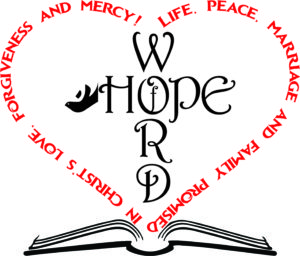by Deaconess Pamela Buhler and Deaconess Chrissie Gillet
Sometimes we view hedges as helpful. They define and reinforce boundaries. This crude fortification of protection also provides a place to hide from the potential risk of pain and suffering. However, it is a false sense of security and only isolates us from others. Hedges tend to become too thick or grow out of control and obscure the importance of fellowship with family and the Christian community.
 Word of Hope (888.217.8679) recognizes that when one person is in distress, it affects the whole family. Your family could consist of immediate family members, a congregational network, a group of close friends, or your relationship with the Lord. When you suffer, these relationships suffer right along with you, even when you try to hide from problems or avoid the pain of suffering.
Word of Hope (888.217.8679) recognizes that when one person is in distress, it affects the whole family. Your family could consist of immediate family members, a congregational network, a group of close friends, or your relationship with the Lord. When you suffer, these relationships suffer right along with you, even when you try to hide from problems or avoid the pain of suffering.
At Word of Hope, we help people who are suffering, perhaps people like you, to grow stronger in the hope of Christ’s comfort while suffering and to reconcile relationships (2 Corinthians 1:5). We walk alongside you in the journey of exploring your perception of suffering as something to hide from or something to embrace. Learning how Christ bore our suffering and gaining a better understanding about the purpose of suffering are important parts of the expedition. Along the way, we share the truth about suffering as a tool God uses to reveal His great love for us (John 3:16), expose our sin (1 Corinthians 11:30-32), strengthen faith (James 1:2-12), increase our dependence on the Lord (2 Corinthians 12:7-10), make us more Christ-like (Hebrews 12:11), and even provide an opportunity to share with others our reason for hope (1 Peter 3: 15). Your perception of suffering, especially the belief that suffering is purposeful or purposeless, can dramatically impact your ability to persevere despite suffering.
The two disciples, Judas and Peter, illustrate different approaches to suffering with the conviction of sinning against Jesus. Although Judas returned the silver, he still avoided the responsibility for his sinful behavior (Matthew 27:3). He hid from Jesus and the other disciples, thereby forgoing the opportunity for forgiveness and reconciliation. In his isolation, he was tempted to believe that he was all alone and unforgivable. In Satan’s final attack, Judas was convinced his pain was more than he could bear. Ultimately, he succumbed to despair and the conviction that ending his life was the only way to avoid suffering (Matthew 27:5).
Alternatively, when Peter realized he was responsible for denying Jesus three times, he wept bitterly (Matthew 26:75). Instead of hiding from the disciples, Peter likely confessed the fulfillment of Jesus’s prediction to his brothers while they were commiserating together over Jesus’ crucifixion. Upon Jesus’ return, Peter was forgiven three times and reconciled to Christ (John 21:15-17). As a result, Peter became a leader among the disciples and the first to preach about Jesus’ suffering, death, and resurrection for the forgiveness of sins (Acts 2).
Like these two disciples, we all fear suffering and struggle with the conviction of sin. You are not alone; Christ is always with you (Matthew 28:20). Yet, there may be times you are tempted to hide and barricade yourself behind hedges of false protection or isolate yourself from the possibility of forgiveness and reconciled relationships. In these moments, remember that Word of Hope is here for you. We are here to listen without judgment and journey with you through the guilt, shame, and fear associated with past sins towards the freedom found only in Christ’s forgiveness. Together we will rejoice. “Rejoice insofar as you share Christ’s sufferings, that you may also rejoice and be glad when his glory is revealed” (1 Peter 4:13).
